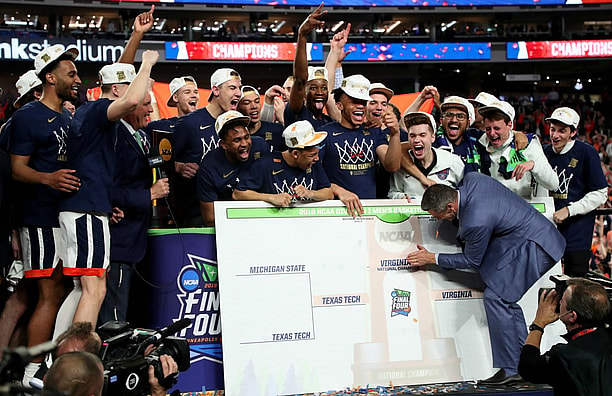[griojw id=”iPzID9zY” playerid=”GqX43ZoG”]
On Monday night the University of Virginia, the only No. 1 seeded team to reach the NCAA Men’s Final Four, celebrated a hard-fought overtime win over Texas Tech 85-77.
But the school, sits in Charlottesville, which was the site of the racially volatile Unite the Right rally in nearly two years ago, which killed one person and injured at least 19 others. Now, the victory celebration and jubilation that went on into the early hours of Tuesday is helping the college town move forward from the agony it experienced in that incident.
READ MORE: Black man in Charlottesville held at knifepoint as bystanders stared
The August, 2017 white supremacist demonstration cut through the city and onto the campus, ending with the death of counter-demonstrator Heather Heyer. The 32-year-old woman was in a crowd that was plowed into with a car by neo-Nazi James Fields. He was convicted in December of first-degree murder and a jury recommended life imprisonment for him. He also pleaded guilty to federal hate crimes last month.
But in the same streets where horror and grief was expressed in the summer of 2017, beer-fueled U-Va. students on Monday were shouting and cheering to celebrate the Cavaliers’ victory. The NCAA Championship win, its first ever, also marked the school’s first entry into the NCAA Final Four since 1984.

“It’s certainly attracting a great amount of positive attention, which is a nice antidote to the avalanche of negative attention” that followed the white supremacist demonstration, Larry Sabato, director of the school’s Center for Politics, told The Washington Post.
Sabato also told The Post that Charlottesville is “heaven” to live in and pointed out that the marchers from 2017 were from out of town.
“Nothing’s changed,” he said. “It’s just the outsiders.”
Two years ago, this community watched white supremacists march through town with tiki torches and shout racist slogans. Protesters demonstrated over a proposal to remove a statue of Confederate army Gen. Robert E. Lee, which stood at a city park. The unrest made the name Charlottesville synonymous with racial violence.
READ MORE: Why Biden and Obama could not remain silent after Charlottesville
On Monday evening, however, the frustration that lingered over that episode was put aside, if only for a little while. Instead, the campus scene was of jubilant students ripping off their clothes and taking part in a ritual normally relegated to the privacy of the late hours, as they streaked across the school’s Lawn.
Daniel Redd, 24, an urban planning graduate student from Norfolk, Va., told The Post that he feels good about the difference he saw on campus and that a corner may have been turned.
“Maybe it can change the narrative, hopefully,” he said.
Some progress has been seen in the town since the violence. Last year, Nikuyah Walker, an activist and city council member, was elected mayor. Also, to mark the second anniversary of the tragedy, a group is actively planning what they are branding “Unity Days” for Aug. 10-12, which will have music, arts and healing activities.
“When you have people committed to the movement, committed to making sure that there’s equity and justice and truly understand it, it shifts the conversation,” Walker told theGrio last August.
Brian Wheeler, director of communications for the City of Charlottesville, told local station WDBJ-TV that the city wants to look ahead and bank on the good feeling generated by the Cavaliers’ victory.
He said he understands that what happened during the violent rally can’t be forgotten so soon, but he feels it’s time for UVA and Charlottesville to move forward.
“We need to keep the focus on the hard work that we need to do in Charlottesville,” Wheeler explained. “We want to turn the positive energy into positive change. We do want the community to know that we are really focused on racial justice, economic justice, those are the things we really need to turn the corner on.”
READ MORE: Charlottesville’s Mayor Nikuyah Walker talks about the long road of hope and healing in her city

